AI tools are not a one-dimensional automation phenomenon, but a complex system of technologies. These solutions are potent tools that use features like machine learning, neural networks, NLP, or other complex algorithms to completely transform each aspect of game development. AI is a hidden gem of modern game developers that goes from establishing complex game environments to creating real NPCs, improving the player experience, and even trivialities such as rationalization of development procedures. Through the smart behavioral inspection of players, creating unique content, and managing intricate operations, such tools allow the developers to concentrate on what makes a game great – conceptual originality.
When examining the number one AI tools for game developers in 2025, one will find out how such technologies expand the definition of what a game is. Next, there are machine learning frameworks, as well as other modern analytics platforms that are considered to be at the peak of groundbreaking solutions in game development. Moreover, these AI tools are also becoming an essential AI tool for presentation, enabling developers to create interactive, data-driven presentations that enhance the way game features and mechanics are showcased to stakeholders and audiences.
What Are Game Developers Tools?
AI tools for game developers represent a category of software solutions and frameworks designed for the process of game development and gameplay and which are built upon the usage of AI technologies. These tools utilize advanced technologies such as:
- Machine Learning Algorithms
- Neural Networks
- Natural Language Processing
- Computer Vision
- Techniques of Procedural Generation
Benefits of AI Tools for Game Developers
- Enhanced Game Intelligence: Perhaps make more believable characters in the game world as game characters should be able to learn, act or even react in some way.
- Personalized Player Experiences: Develop environments for games that respond to a player and the pattern of playing the game.
- Efficient Development Processes: Simplify development thereby; reducing the time taken in performing repetitive tasks and liberating the’ brains,’ of the developers.
- Advanced Analytics: To obtain an understanding of the dynamics of the player’s actions, the executive summary assesses the interaction function of the developed game application and evaluates the applied engagement factors.
- Cost-Effective Production: In stages of development there is less use but efficiency.
- Procedural Content Generation: Develop big and separate instances of games and worlds that can be hardly modified by the developers themselves.
Comparison Table
| Tool Name | Ease of Use | Best Fit | Free Plan Available |
| Unity ML-Agents | Moderate (steep learning curve) | Game developers using Unity who want reactive NPCs | Yes (Open-Source) |
| Unreal Engine AI | Complex (requires high-level programming) | Developers creating realistic games with Unreal Engine | No (Royalties after $1M revenue) |
| IBM Watson | Complex integration | Games with complex narratives and dialogues | No (Custom pricing) |
| Google DeepMind | Complex (requires technical knowledge) | Developers creating adaptive, intelligent AI characters | No (Research/commercial licensing) |
| NVIDIA DLSS | Easy (focus on performance optimization) | Developers working on graphics-intensive games | Yes (Free) |
| GameSparks | Moderate (requires backend integration) | Multiplayer and online game developers | No (Contact for pricing) |
| TensorFlow | Steep learning curve, highly customizable | Developers mastering Python and machine learning | Yes (Open-Source) |
| Inworld AI | Easy to moderate (easy integration) | Developers of narrative-driven, immersive RPGs | No (Contact for pricing) |
| OpenAI’s GPT | Moderate (requires programming knowledge) | Narrative-driven games requiring complex dialogue | No (API-based pricing) |
| Modl.ai | Moderate (requires setup for testing) | Game studios focused on automated testing | No (Enterprise pricing) |
Top 10 AI Tools for Game Developers
1. Unity ML-Agents
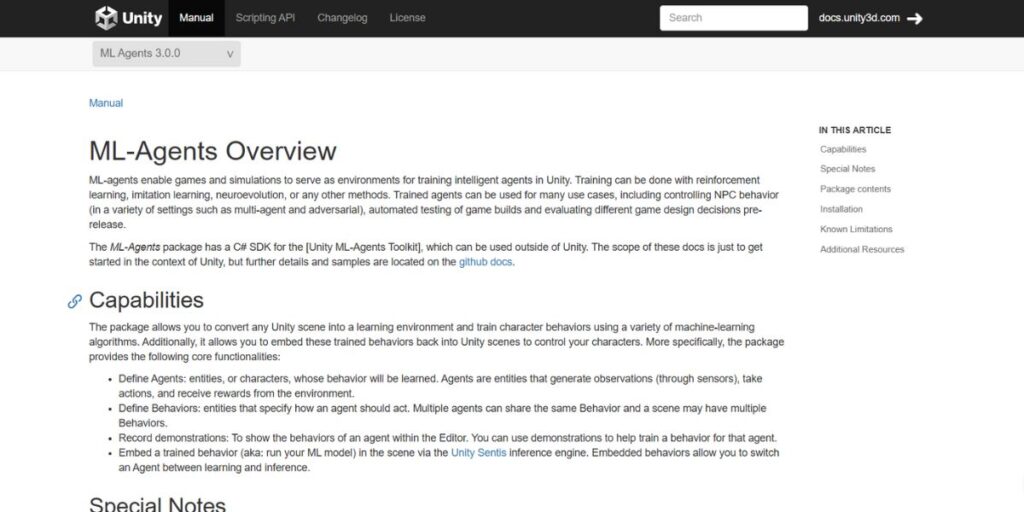
Unity ML-Agents is an open-source toolkit designed to integrate machine learning into Unity projects. It gives various approaches to reinforcement learning and imitation learning by which one can develop intelligent learning agents. These agents can be trained, people can program these, to learn from their surrounding environment so that NPCs would react.
This tool provides integration with Unity’s engine and allows developers to exercise the creation of powerful AI behaviors ML-Agents has gained powerful community backing and commendable documentation making Unity ML-Agents suitable for game developers that need AI agents that may learn from the actions of players.
Key Features:
- Sophisticated reinforcement learning algorithms
- The bit player can also integrate seamlessly with the Unity game engine
- One of the primary advantages of the approach is that it offers the possibility of training environment customization.
Pros:
- Open-source and free-to-use
- Availability of records and social networks
- Highly flexible and adaptable
Cons:
- The major weakness that changed the course of the company for the better, especially for the beginners is the fact that they have to cover a steep learning curve.
- About it it’s is quite a computation-intensive
- Advanced style, extensive configuration
Ideal For:
- Game developers who use Unity as an engine and who would like to have realistic and reactive game characters.
Pricing:
- Free (Open-Source)
- Unity Pro: $185.00/mo
- Unity Enterprise: Contact For Pricing
Rating: 4.5/5
Website: https://docs.unity3d.com/Packages/com.unity.ml-agents@3.0/manual/index.html
2. Unreal Engine AI

AI in Unreal Engine‘s AI toolkit provides extra features to assist game developers in developing more realistic NPCs. Behavior trees, tI perception systems, and environment query systems where characters can emulate or mirror the game environment. One key that I like is that NPCs can learn from the player based on their behaviors in Unreal Engine AI.
The toolkit also helps build complex AI for enemies so that players can enjoy more interactive as well as complex games. Due to such a close connection of AI with the overall engine, Unreal Engine would be the best fit for professional game developers who work with the platform.
Key Features:
- Advanced behavior tree system
- Environment query capabilities It is indeed encouraging to note that enhanced capabilities in environment query have continually evolved in the present environment.
- Simulation of the actual sensory image
Pros:
- Integrating into Unreal Engine to its deepest level
- Intense role demonstrations
- Availability of numerous choices and anpreferencesce for customization
Cons:
- Complex implementation
- Autonomous – demands from high-level programming knowledge
- Performance-intensive
Ideal For:
- Realistic video game developers that utilize Unreal Engine
Pricing:
- Game developers (royalties apply after $1 million gross product revenue)
Rating: 4.7/5
Website: https://www.unrealengine.com
3. IBM Watson
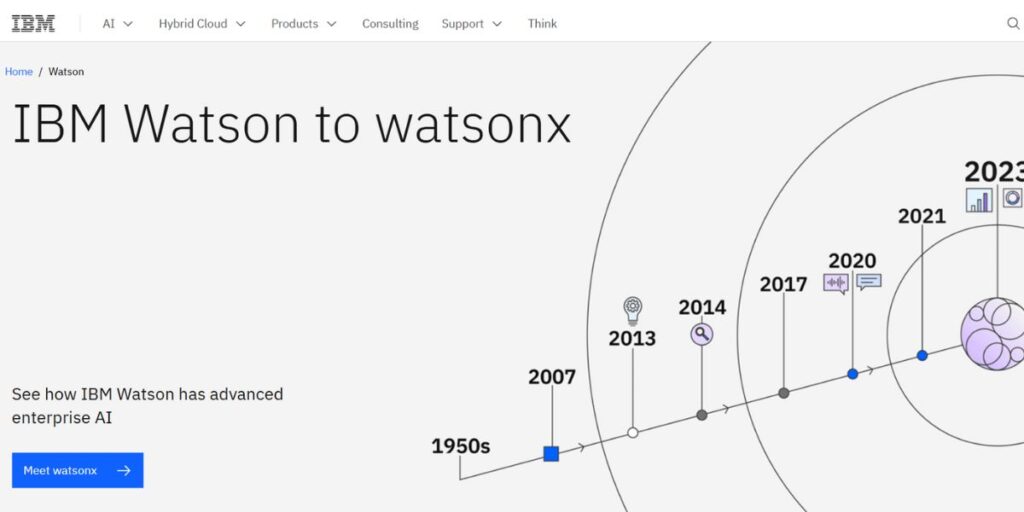
IBM Watson introduces the game industry to natural language processing advances at its finest. In the same way, with Watson, developers can make NPCs drive human-like conversation as far as they can get with the conversation. This tool allows customization of following and being followed dependent on context and supports the directions based on narrative.
Since Watson possesses the ability to handle multiple languages, this gives chances for a completely new, more friendly, more international gaming experience. That is why by integrating Watson, developers can create not only elaborate but also quite realistic NPCs for game narratives. This AI tools for game developers is particularly suitable for games that follow the plot, in which the natural scenario and effective conversation are crucial to amuse the player.
Key Features:
- Sophisticated techniques in the analysis of text message content
- Contextual understanding
- Multilingual support
Pros:
- Some of the most complex languages are used in natural language processing and understanding.
- Adaptive conversation systems
- Enterprise-grade reliability
Cons:
- Stiff for small developers
- Complex integration
- Potential latency issues
Ideal For:
- Games that involve narratives that a player interacts with and wherein they have to use complex dialogues
Pricing:
- Custom enterprise pricing
Rating: 4.3/5
Website: https://www.ibm.com/watson
4. Google DeepMind
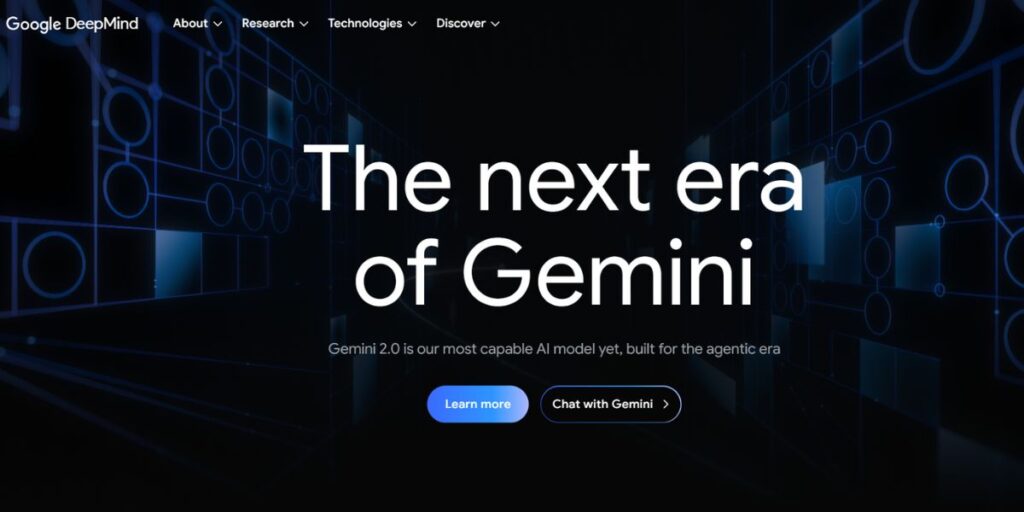
Google DeepMind is one of the most active contributors to the AI world and provides highly effective reinforcement learning resources for game designers. With DeepMind, programmers can design playfully smart game avatars that can improve based on the actions made by the player and make the gameplay more challenging.
Through the NPCs, DeepMind has found a way of achieving decision-making from live data, which makes the AI responses more interactive. These deep reinforcement learning tools are especially powerful for deciding the models in which the NPCs have to learn as well as change dynamically as the game proceeds. That is ideal for those developers who want to create very innovative intelligent AI figures.
Key Features:
- Deep reinforcement learning
- Adaptive AI algorithms
- Multifaceted models of choice
Pros:
- Cutting-edge machine learning
- Closely following the basic elements of impressive characters, here it is suggested that highly adaptive game characters should be pursued.
- Enhanced learning-through capabilities
Cons:
- Demands a substantial amount of technological knowledge
- Stochasticity refers to something random, probabilistic, or highly computational.
- Complex implementation
Ideal For:
- Authors expressing interest in the contemporary evolving Path of the AI character
Pricing:
- Research and commercial licensing available
Rating: 4.6/5
Website: https://deepmind.com
5. NVIDIA DLSS
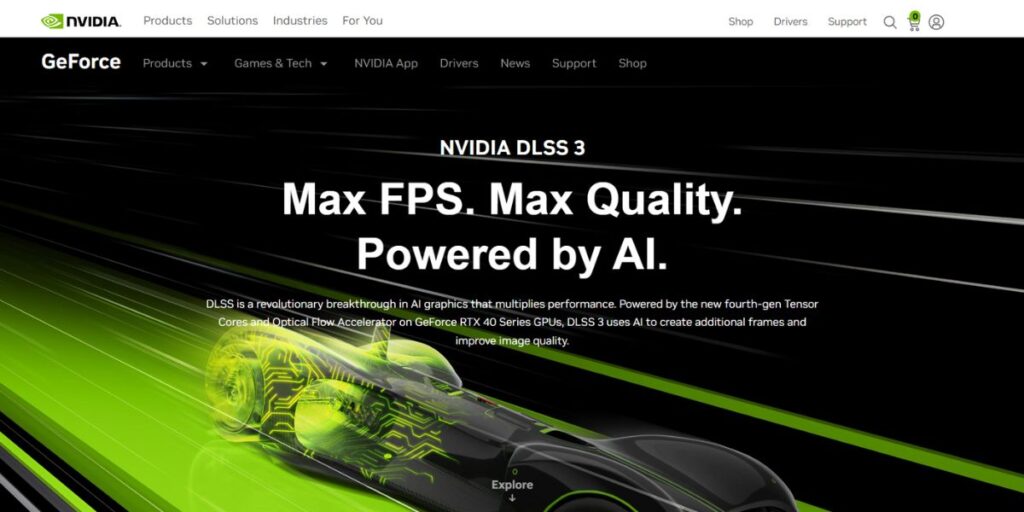
The technology known as NVIDIA Deep Learning Super Sampling or simply NVIDIA DLSS is an incredible Machine learning tool that enhances game graphics since the images are up-sampled in real-time. Based on deep learning, DLSS improves image quality and delivers significantly more frames, which makes it possible to receive detailed pictures at high resolutions and enjoy the game process.
Thus preserving total frame rates is another advantage of DLSS and it is perfect for for graphics-intensive games since it does not degenerate the picture quality. If one wants to have high-quality performance from developers without thinking about efficiency DLSS is a big advantage for the gameplay and rendering quality.
Key Features:
- Real-time image upscaling
- Rendering using a neural network.
- Performance optimization
Pros:
- A great deal of enhancement of the graphics rates
- Higher frame rates
- Minimal visual quality loss
Cons:
- Crain NVIDIA RTX graphics cards
- Limited to supported games
- Possible objects within complex environments
Ideal For:
- Optimizing Graphics for Windows: Graphics Performance and High-Definition Games
Pricing:
- Free
Rating: 4.8/5
Website: https://www.nvidia.com/en-us/geforce/technologies/dlss/
6. GameSparks
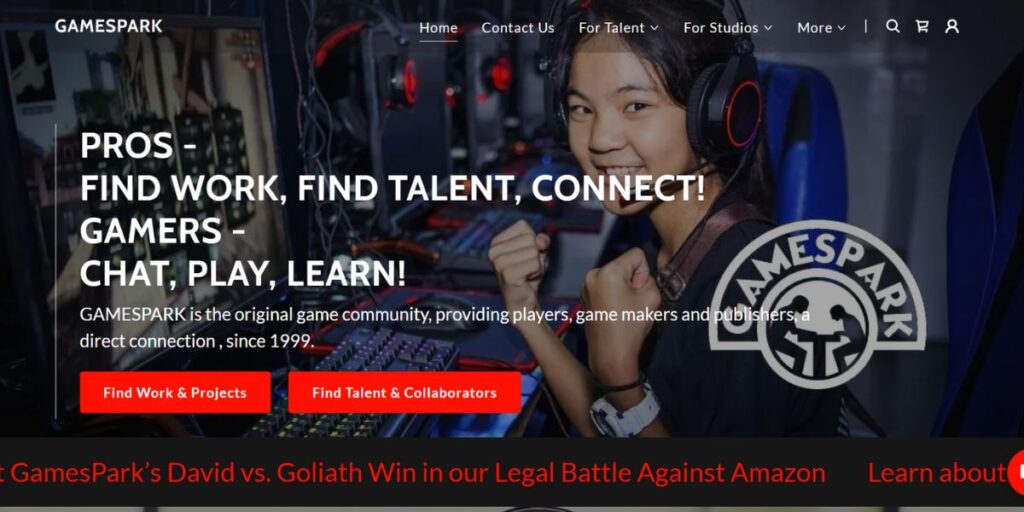
Amazon Web Services has a cloud-based backend service named GameSparks that includes AI-based analytics to enhance the player’s behavior and game mechanics. With realistic information surveillance of players, the developers get information that could be applied to the individualized aspects of the players and increase their interaction with the game. This makes GameSparks an effective customer analytics tool, providing developers with valuable insights to better understand and engage their audience.
It is embedded with other structures of games to serve as a base for multiplayer and online games amid issues to do with scaling. As such, with GameSparks, developers can very easily generate real-time dynamic content based on the gameplay provided to the players. This AI tools for game developers is of most help to those seeking to deal with multiple backend issues and gain valuable insights for game optimization.
Key Features:
- Cloud-based analytics
- Player behavior tracking
- Real-time personalization
Pros:
- Comprehensive player insights
- Scalable infrastructure
- Easy integration
Cons:
- Ongoing subscription costs
- Loose Data Privacy Consideration
- Dependency on cloud services
Ideal For:
- Multiplayer and online game developers
Pricing:
- Contact For Pricing
Rating: 4.4/5
Website: https://aws.amazon.com/gamesparks/
7. TensorFlow
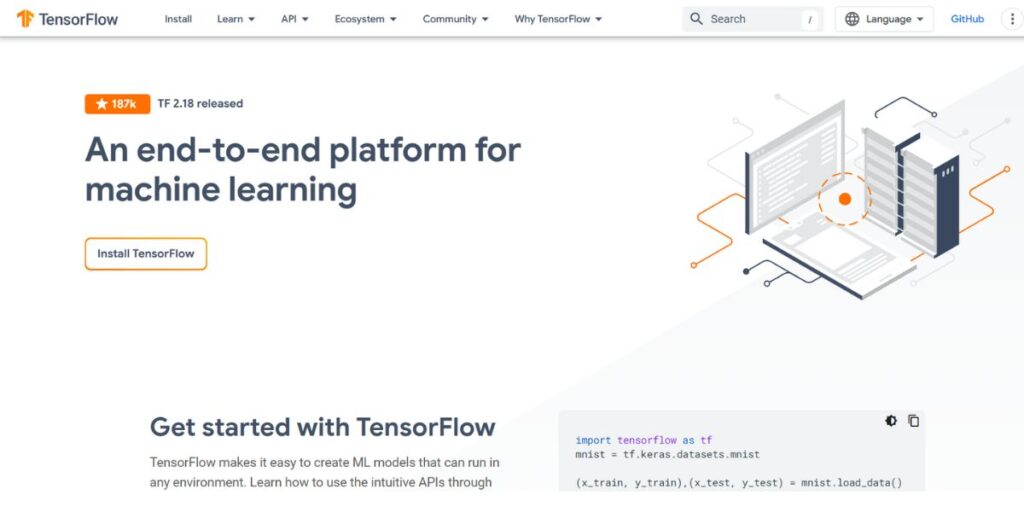
TensorFlow is an open-source developed by Google that provides a large variety of models and tools for machine learning in game development applications. Using TensorFlow, procedural content is generated, player behaviors are modeled, and AI-based game systems are improved by developers. It is versatile and portable; hence it can be used for virtually any aspect of game development.
TensorFlow has a large following and the kind of support that enables developers to work on complicated artificial intelligence. From generating neural characters to implementing gameplay AI, TensorFlow provides the degree of freedom required to address sophisticated AI issues in games.
Key Features:
- Scalable and elastic machine learning architecture
- The possibility of applying a great number of pre-trained models
- Cross-platform support
Pros:
- Completely open-source
- Highly customizable
- Strong community support
Cons:
- Steep learning curve
- Needs very sophisticated programming
- Complex setup
Ideal For:
- Those who master both machine learning and the programming language Python.
Pricing:
- Free (Open-Source)
Rating: 4.5/5
Website: https://www.tensorflow.org
8. Inworld AI
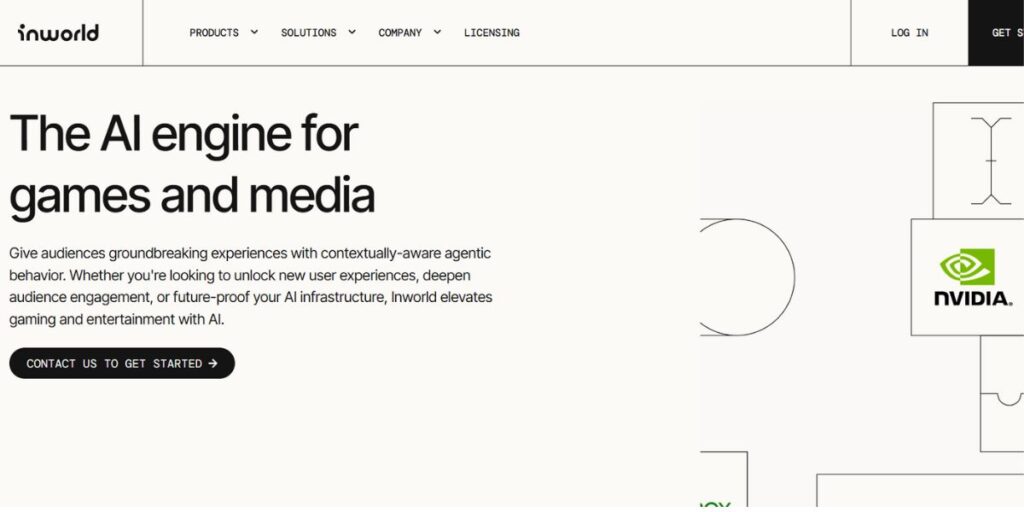
Inworld AI revolves around developing virtual characters who are convincing and who can respond in a synchronized manner to users through the exploitation of NLP and machine learning. It allows developers to construct adaptive conversations and also develop highly effective interactive characters in their games. Inworld AI is created with narrative-intensive, immersive games in mind so that characters can react and change based on player behaviors.
This tool is incorporated into game engines with ease, presenting players with natural ways to incorporate diverse character engagements in games. To be specific, it can be stated that Inworld AI enables developers to create better game environments, so NPC would be an active participant in the game’s process.
Key Features:
- Advanced NLP capabilities
- Situational character encounter
- Adaptive dialogue systems
Pros:
- Very realistic context and character discussions
- Easy integration
- Continuous learning
Cons:
- Potential subscription costs
- Limited customization
- Language model limitations
Ideal For:
- Story-driven and RPG game developers
Pricing:
- Contact For Pricing
Rating: 4.3/5
Website: https://www.inworld.ai
9. OpenAI’s GPT

OpennAI GPT (Generative Pretrained Transformer) is among the greatest language generation technologies available to game developers. With the GPT, it is possible to develop the dialogue and, depending on the player’s actions, generate a new continuation of the plot.
That is why AI is suitable for RP games in which dialogue is the core of the gameplay process and often depends on NPCs’ responses to players’ actions. GPT models are multilingual, helping OpenAI’s developers to address more users while providing increased realism and emotion in the games’ narratives and interactions.
Key Features:
- Advanced language generation
- Contextual understanding
- Multilingual support
Pros:
- Language models of an almost ridiculous level of complexity
- Highly adaptable
- Continuous improvements
Cons:
- Possible high computational complexity
- Ethical considerations
- Unpredictability in outputs
Ideal For:
- Narrative-driven games requiring complex dialogue
Pricing:
- Contact For Pricing
- API-based pricing
Rating: 4.6/5
Website: https://openai.com
10. Modl.ai
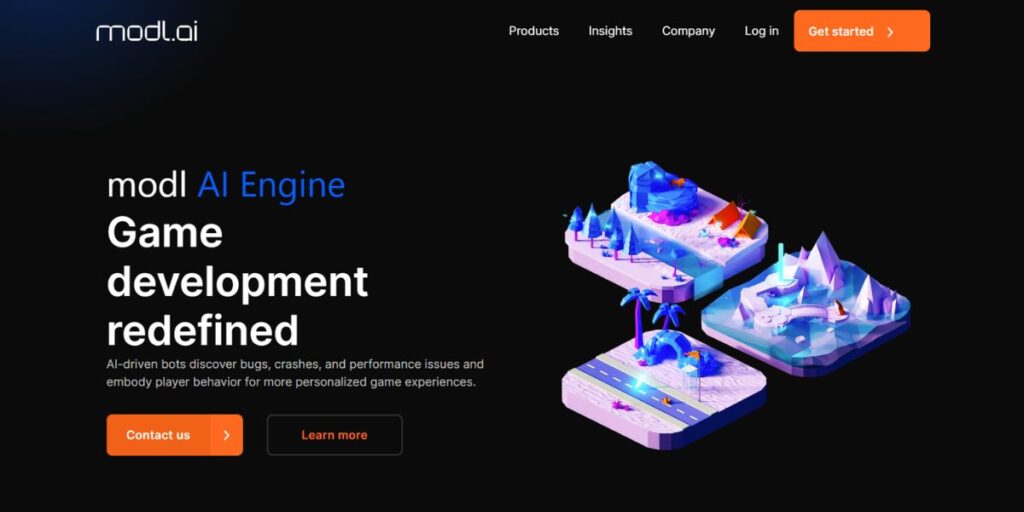
Modl.ai focuses on the use of intelligent techniques in game testing, to mimic players in the games. Some of the features of this platform are that it has self-operating bots that generate quality assurance tests and find bugs; this platform offers complete coverage for several scenarios in games. Thanks to the feature of testing, Modl.ai is capable of running through thousands of game sessions and identifying problems, that are not found by regular manual checks.
Through certain enhancements to this phase of the process, developers may reduce the time and cost investment while simultaneously increasing the quality of the gameplay. This tool will be most useful for game studios looking for dependable, accurate,e and repeatable testing solutions for their games.
Key Features:
- Automated game testing
- Player behavior simulation
- Comprehensive bug detection
Pros:
- Reduces manual testing time
- Termed as Finding It Finding It, it distinguishes difficult-to-find problems.
- Coherent approach to testing
Cons:
- Can be expensive
- May lack subtle human testing observations
- Should be carefully set up
Ideal For:
- Developing game studios in search of effective testing tools
Pricing:
- Enterprise pricing model
Rating: 4.4/5
Website: https://modl.ai
Best Practices for AI Tools For Game Developers
- Start Small: It is much better to start with specific AI use cases instead of trying to solve large problems all at once.
- Continuous Learning: AI models need to be updated and trained continually, in order to offer their best output.
- Ethical Considerations: On our product, the player experience and their privacy are paramount principles to follow.
- Performance Optimization: If used within reasonable measures, AI should have certain computational resources overseen, and efficient deployment should be managed.
- User Testing: It is important to incorporate AI tools with actual playtesting for an advanced inspection.
Future Trends in AI Tools for Game Developers
- Procedural Content Generation (PCG): Due to the use of AI algorithms complex game worlds, quests, and levels are being developed. Future tools will gain, further improving the enclosing and integrating PCG with the existing player-driven narratives.
- AI-Powered Game Testing: QA functions will improve from using AI in that bugs, balancing issues, and other user experience challenges will be identified in the quickest way possible.
- Realistic NPCs and Enemy Behaviors: Singer claimed that in future games, it’ll be possible for NPCs to actively follow a player’s actions to create a better gameplay experience.
- Generative AI for Visuals and Audio: As for generators like GANs they will enable the developers to generate realistic textures and characters, fast sound, and environment designs.
- AI-Driven Player Analytics: Tools will help in gaining a better understanding of players and their behavior and in balancing the game as well as using the appropriate revenue models.
Conclusion
AI Tools for game developers today is not a mere option but a must-have tool that is positively indispensable in game development today. In the further course of developing technologies, these tools are going to act as a major point in presenting more and more realistic, intelligent, and captivating game environments. This is where the devil is in the details, and the question is not about using AI tools at all but about how and when to apply them. Any developer who masters these technologies will be at the helm of the gaming industry, able to design a game that was impossible before.
FAQs
1. Are AI tools expensive?
Although free and open-source, cost can be an issue at the lower end of the spectrum, ranging from free, to expensive enterprise-level products. Pricing schedules are available to address a range of development scales among these many firms that offer their services to their clients.
2. Am I required to be a professional programmer?
Some of the tools are complex to use but as the document and growing communities suggest the tools are easy to use.
3. Is it possible to eliminate human game developers and replace them with AI?
He says, No., these are essential tools for writers and artists to aid and enhance their work, not to do it for them.
4. Is the compatibility of AI tools with game data still relatively unknown?
As with any tools that deal with data, professional AI tool makers protect data but often revisit their privacy and security stances.
5. What is the best AI tool for game developers?
Newcomers to AI in game development, Unity ML-Agents, and TensorFlow boast reliable references and support.

